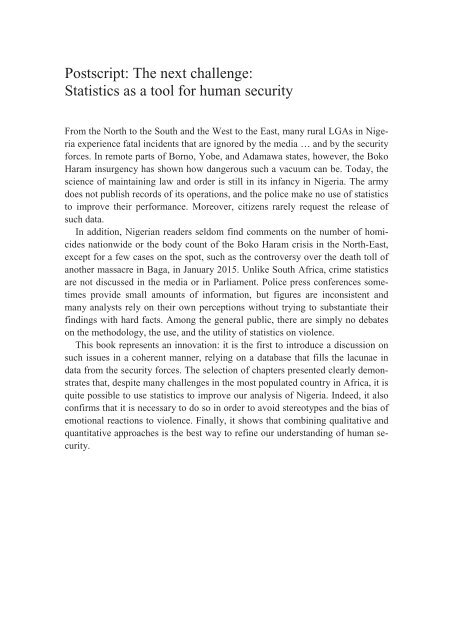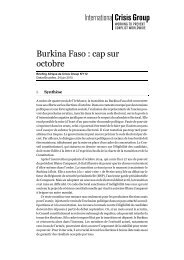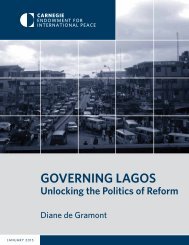Violence in Nigeria
ASC-075287668-3743-01
ASC-075287668-3743-01
Create successful ePaper yourself
Turn your PDF publications into a flip-book with our unique Google optimized e-Paper software.
Postscript: The next challenge:<br />
Statistics as a tool for human security<br />
From the North to the South and the West to the East, many rural LGAs <strong>in</strong> <strong>Nigeria</strong><br />
experience fatal <strong>in</strong>cidents that are ignored by the media … and by the security<br />
forces. In remote parts of Borno, Yobe, and Adamawa states, however, the Boko<br />
Haram <strong>in</strong>surgency has shown how dangerous such a vacuum can be. Today, the<br />
science of ma<strong>in</strong>ta<strong>in</strong><strong>in</strong>g law and order is still <strong>in</strong> its <strong>in</strong>fancy <strong>in</strong> <strong>Nigeria</strong>. The army<br />
does not publish records of its operations, and the police make no use of statistics<br />
to improve their performance. Moreover, citizens rarely request the release of<br />
such data.<br />
In addition, <strong>Nigeria</strong>n readers seldom f<strong>in</strong>d comments on the number of homicides<br />
nationwide or the body count of the Boko Haram crisis <strong>in</strong> the North-East,<br />
except for a few cases on the spot, such as the controversy over the death toll of<br />
another massacre <strong>in</strong> Baga, <strong>in</strong> January 2015. Unlike South Africa, crime statistics<br />
are not discussed <strong>in</strong> the media or <strong>in</strong> Parliament. Police press conferences sometimes<br />
provide small amounts of <strong>in</strong>formation, but figures are <strong>in</strong>consistent and<br />
many analysts rely on their own perceptions without try<strong>in</strong>g to substantiate their<br />
f<strong>in</strong>d<strong>in</strong>gs with hard facts. Among the general public, there are simply no debates<br />
on the methodology, the use, and the utility of statistics on violence.<br />
This book represents an <strong>in</strong>novation: it is the first to <strong>in</strong>troduce a discussion on<br />
such issues <strong>in</strong> a coherent manner, rely<strong>in</strong>g on a database that fills the lacunae <strong>in</strong><br />
data from the security forces. The selection of chapters presented clearly demonstrates<br />
that, despite many challenges <strong>in</strong> the most populated country <strong>in</strong> Africa, it is<br />
quite possible to use statistics to improve our analysis of <strong>Nigeria</strong>. Indeed, it also<br />
confirms that it is necessary to do so <strong>in</strong> order to avoid stereotypes and the bias of<br />
emotional reactions to violence. F<strong>in</strong>ally, it shows that comb<strong>in</strong><strong>in</strong>g qualitative and<br />
quantitative approaches is the best way to ref<strong>in</strong>e our understand<strong>in</strong>g of human security.






